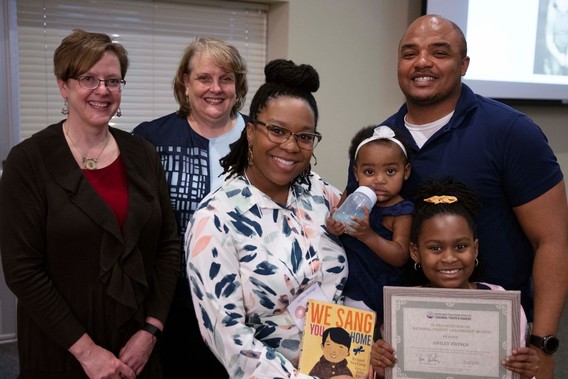Celebrating Parent Recognition Month and Unsung Heroes in Washington

Parenting can come with its challenges. Rewarding and joyful, but also difficult at times. This past year, parents and primary caregivers have been called upon more than ever to be the buffer for the traumatic experiences our world has faced.
In an effort to acknowledge the powerful work parents do every day, Gov. Inslee proclaimed February as Parent Recognition Month and we are celebrating the extraordinary caregivers in our state with the Washington State Department of Children, Youth, and Families’ (DCYF) annual Unsung Heroes campaign.
“This past year has seen inconceivable, unprecedented struggles for Washingtonians. There has been so much uncertainty and change to navigate,” Gov. Inslee said. “Parents and caregivers across the state are supporting their children, families, and communities in exceptional ways through this pandemic. They are shaping the Washington of today and of the future, devoting their time and resources to help children and their families thrive.”
Each year, DCYF recognizes 28 parents and caregivers in Washington for the roles they take with their families, schools, and communities. They are recognized because they show strength, courage, and empathy. We focus on honoring individuals who have used one or more of the protective factors to make a difference in their community or a child’s life:
- Parental Resilience – overcoming hard times and bouncing back
- Concrete Supports in Times of Need – knowing where to turn to for help
- Social and Emotional Competence of Children – knowing how to help children talk about feelings
- Social Connections – reaching out and knowing who can support you
- Knowledge of Parenting and Child Development – knowing where to go for information on parenting skills and children’s developmental growth
This month, we are recognizing another 28 individuals who were nominated for the Unsung Heroes award. We’re partnering with Seattle’s Child magazine to feature one honoree each day. Follow DCYF’s Facebook and Twitter feeds each day to see who the Unsung Hero is.
There will be a virtual Unsung Heroes Awards Ceremony on February 25. Email dcyf.strengtheningfamilies@dcyf.wa.gov to attend or participate in the virtual event.
We hope you find their stories as inspiring and uplifting as we do. To all our honorees: congratulations!
Current Child Welfare Guidance

Thank you for doing your part to support families, caring for children and youth, and continuing to keep our communities safe.
We want to assure you that our leadership is continuing to monitor any new developments about the spread of the coronavirus. Please refer to the guidance below:
Combined In-Home Service Providers Guidance Document - Jan. 29, 2021
Family Time In-Person Visitation Protocol During COVID-19 Parent Information
Family Time In-Person Visitation Protocol During COVID-19 (Foster Parents and Caregiver Information)
Family Time – Supportive Virtual Family Time Program and Training (eLearning)
Supportive Remote Visitation for Children in Foster Care Video
Allowable Child Care for Children in Out-of- Home Placement During COVID-19
Accessing Child Care for Children in Out-of- Home Placement During COVID-19
Continue to Report Child Abuse and Neglect - April 16, 2020
Child Abuse Prevention Month Mandatory Reporter Graphic
Technology for Virtual Services - Tip Sheet
For additional guidance, visit www.dcyf.wa.gov/coronavirus-covid-19/child-welfare. For copies of previously published guidance, visit the Washington State Publications Library or email communications@dcyf.wa.gov.
Extended Foster Care Rent Assistance Update

In August 2020, the Washington State Department of Commerce: Office of Homeless Youth (OHY) allocated $1 million in CARES Act funding to DCYF to provide stipends to young adults who aged out of Extended Foster Care at age 21, between March 1, 2020, and Dec. 31, 2020. The purpose of the funding was to support housing stability for these youth during the COVID-19 crisis.
DCYF provided 185 eligible youth with $800 for each month that they were eligible. For example, youth who turned 21 years old in March 2020 received up to $8,000 over the 10 months.
“It was so, so, so helpful,” said one recipient. “Not only did I pay off two collection accounts, I paid the back rent owed to my apartment complex, put $1,000 down toward the debt on our car, bought some appliances for our apartment, and was actually able to have some spending money for Christmas presents for my family. I am so grateful.”
Youth who turned 21 years old between March 2020 and September 2020 received one check for every month they had been out of foster care through October. They then received one check per month, including December 2020. Many youth expressed their sincere gratitude to finally be able to meet basic needs for food, clothing, bills, transportation, and in one instance, a simple can opener.
Read More
Proclamation Prevents Foster Youth from Aging Out During Pandemic

ov. Jay Inslee signed a proclamation today that would prevent foster youth from aging out during the pandemic.
Proclamation 21-02 ensures Washington’s foster care services can be provided during the COVID-19 pandemic to persons who would otherwise be too old to be eligible for such services and eliminates certain eligibility requirements for foster care services. The proclamation goes into effect immediately.
Prior to this proclamation, foster youth would no longer be eligible for foster care services once they turned 21. Under Proclamation 21-02, foster youth who turned 21 on April 1, 2020, or later are still eligible for foster care services through the Department of Children, Youth, and Families.
Eligible youth who were previously aged out can call the intake number 1-866-END-HARM, to re-enroll in services.
Read More
Exceptional Placement Report and Recommendations

This month both Patrick Dowd from the Office of the Family and Children’s Ombuds and I testified in a House committee about hotel stays. You can see our testimony here. The Ombuds has severely criticized the Department of Children, Youth, and Families (DCYF) for several years about this problem, which has grown during that time. He’s right, and the media are right for exposing the terrible experiences that the children involved have.
In September I asked the child welfare policy team to propose a solution by the end of 2020. Their report is available here.
